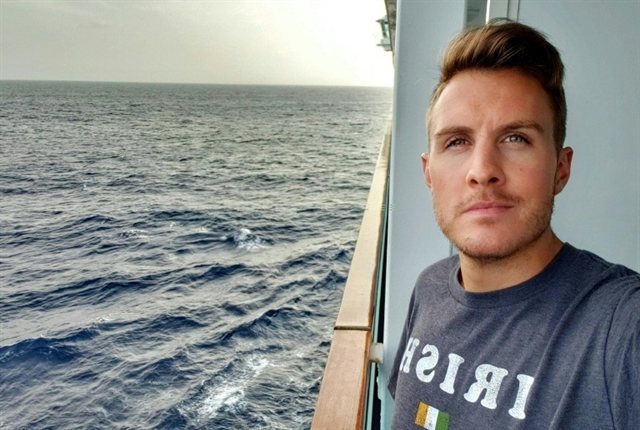 Life & Style
Life & Style


|
| Ryan Driscoll, 26, says he is enduring a lot of "stress and anxiety" while stuck aboard the Seabourn Odyssey, anchored off Barbados -- he has been at sea for nearly three months. AFP/VNA Photo |
MIAMI — For the thousands of cruise ship crew members stuck at sea aboard their vessels as the coronavirus crisis unfolds, the situation is psychologically intense, to say the least.
For some, it has been too much to bear -- at least three crew members are believed to have taken their own lives, and some fear a major mental health crisis is brewing.
"Many of us have a lot of stress and anxiety right now, especially with not knowing what the future holds," Ryan Driscoll, a 26-year-old singer on the Seabourn Odyssey, said.
"We call it Groundhog Day here, the same thing every single day. So it's mentally exhausting," said the American, whose ship is part of an ultra-luxury line wholly owned by Carnival.
Driscoll has been at sea for 80 days. The ship is anchored just off Barbados. He can see land, just 200 yards (meters) away, but cannot get off the boat.
On March 13, US authorities issued a no-sail order as the virus crisis ramped up. Ships with passengers offloaded them -- some more easily than others. But most crews have been in limbo.
"We haven't been given any answers. There's no light at the end of the tunnel," Driscoll said.
Thousands of crew members have been sent home over the last two months, but the process is slow and expensive.
The US Centers for Disease Control and Prevention requires crew to be repatriated on charter flights -- and it gets complicated when their home countries will not accept them.
There are still nearly 60,000 cruise ship employees in or near US territorial waters aboard 90 vessels, the Coast Guard said.
"It does feel like a prison here sometimes," Driscoll said.
Suicide at sea
Many crew members may perceive their plight as a form of forced confinement, akin to jail, according to psychiatrist Eugenio Rothe.
"It can be felt as an emotional loss of everything that is important to the person's life -- their loved ones, their physical and geographical environment, their social environment," said Rothe, a professor at Florida International University in Miami.
"And so there are feelings of abandonment, of loss, and of mourning, which could then in turn lead to depression and even suicidal ideation."
Over the past two weeks, at least four crew members on separate ships have died of causes not linked to COVID-19.
One died of natural causes aboard the Mariner of the Seas, a Royal Caribbean spokesman said. The other three were apparent suicides -- two of those people jumped overboard.
On Friday, dozens of employees staged a protest on the Majesty of the Seas, another Royal Caribbean ship, according to the Cruise Law News blog.
"Do you sleep well, Mr Bayley?" said their signs, referring to Royal Caribbean CEO Michael Bayley.
Crew on Royal Caribbean's Navigator of the Seas staged a hunger strike the week before, but the company said that has been resolved.
Caio Saldanha, a 31-year-old Brazilian DJ who works for Celebrity, a cruise line operated by Royal Caribbean, has been transferred to several different ships -- but is still stranded.
He has filed a complaint with the UN High Commissioner for Human Rights over his "incarceration," saying his employer could have moved quicker to offload them.
Another Brazilian national, a 52-year-old musician who spoke to AFP on condition that his employer remain unnamed, said he fears he will not get home any time soon.
"I'm scared, I don't want to die," he said in a video message sent to AFP, with his face obscured and his voice altered.
"They just left us behind."
Bright side?
Despite the fears of some, others are experiencing their forced isolation as a positive -- they feel safe from the pandemic that is spreading on dry land.
For Rothe, those employees are living this strange moment as a sort of "voluntary confinement" even though they are not on board the ships by choice.
For those people, "isolation can be fruitful in terms of the promotion of self-reflection, psychological and emotional growth," the professor said.
One of these crew is Gonul O, a 39-year-old Turkish woman who sells shore excursions to cruise passengers. She did not wish to reveal the name of her employer.
"For me, this is the safest place on Earth!" she told AFP, after 70 days at sea. Her ship is now headed to Europe, but with Turkey's airports still closed, she will have to remain on board.
"The first days were challenging because I was having this feeling, like being inside a cage," she explained.
"But after that, I changed my mood and I worked on it. I started working out every day and this was also a support to heal my soul and mind."
Gonul says she is writing every day: "I will be preparing a good novel about it all."
Joyce Lopez, a 32-year-old Colombian who works on the Caribbean Princess, a ship operated by Carnival-owned Princess Cruises, says prayers and being thankful is getting her through the days.
She can see other ships from her balcony, all in a jumble off Barbados. Everyone is just waiting to find out what happens next.
"It makes you want to go swimming," she says.
Of course, she knows that beach time is not in the cards, but says memories of past walks in the sand give her "peace of mind." — AFP




